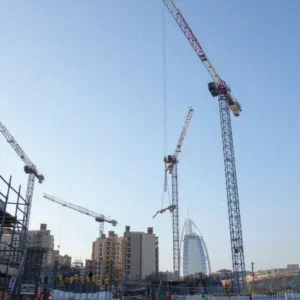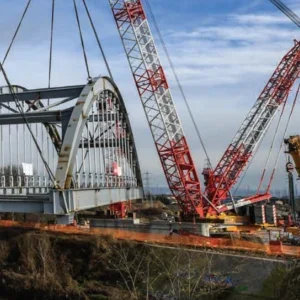Frank Bardonaro, chief operating officer at US crane rental company Maxim Crane Works, answered: “Obviously, the pandemic has had an impact on everyone. Our CEO Bryan Carlisle and the Maxim Leadership team ramped up all safety precautions in early March and equipped our entire workforce with the equipment and practices needed to ensure the health and welfare of our team in the early stages.
“Being classified as an ‘essential services provider’ we had to be certain that our team could function safely throughout the country. I believe that our pro-active approach to developing safe work practices, both in the field and in the office, prepared our team to succeed throughout the initial stages as well as into the current conditions. We worked with our customers to ensure safe projects, aggressive testing and development of protocols to exceed all local and national requirements. This resulted in very positive business levels for Maxim in all areas of the country that allowed projects to continue.”
As for the expectations for the next six months, Bardonaro said: “Maxim has an extremely strong balance sheet and aggressive growth strategy. We realise that there are several companies who focused on oil and gas projects over the past decade and are experiencing financial problems more related to that strategy rather than the pandemic.
However, Maxim has remained ‘upstream adverse’ over that same period and is able to continue its expansion plans via a combination of acquisitions and start up locations during this time. The next 6–12 months will likely remain shaky due to political, civil, medical and commercial issues. These same challenges, however, will become opportunities for companies who did not over-lever during the past cycle. There are always winners and losers during good times and bad times, and Maxim is positioned to continue its successful growth strategy as we work through the pandemic challenges and into the future.”
Kate Lampson, director of PR and communications at Lampson International, answered: “Due to the type of customers that we have and the industries that we service, we were deemed an essential business in the beginning of the pandemic. Since then, we have been able to remain with our doors open and business per usual, which we are grateful for. In terms of upcoming projects, the vast majority of current and future projects have remained on schedule with only a couple seeing delays.
“[Over the next six months] we expect our schedule for current and future projects to remain the same. As for equipment utilisation, that remains steady and we continue to receive requests to bid various projects around the country and around the world.”
UK-based AGD Equipment offers crane rental and sales. Its rental fleet includes, among other construction equipment, crawler cranes and mini cranes.
Robert Law, managing director at AGD Equipment, commented on the effect of the pandemic on the business: “Certainly we are feeling the effects of the virus. We’ve had jobs cancelled, delayed and stopped. Customers’ purchasing plans have halted. We are continuing to do business however and are still cash positive and profitable despite these challenging times. Our rental utilisation is probably running at about 30-40%.
“We expect the remainder of the year to continue at this level. We hope that next year will be better. Once HS2 (high speed railway project) comes fully on stream we believe things will pick up.”
Fellow UK company Falcon Tower Crane Services specialises in the sale and hire of tower cranes. Andy Brown, commercial director at Falcon Tower Crane Services responded to our question: “Towards the end of March, the UK government imposed lockdown restrictions on much of the country.
Despite the government making it clear that the construction industry was to remain open, many contractors decided to close their doors whilst they reviewed their procedures in relation to the virus and social distancing. Most closed for the initial three week lockdown period and reopened, in some form, at the end of April. Some clients still haven’t returned to work.
“Whilst this gives companies like Falcon an initial problem as turnover reduces significantly overnight, we were able to offset the reduction in turnover by the reduced expenditure by taking up schemes such as furlough and repayment holidays. We were also fortunate that during this period over 50 of our tower cranes remained in operation throughout the lockdown. Due to this, we maintained a skeleton crew that continued working throughout.
“As we entered May and June our customers slowly returned to work and we gradually took our employees off furlough. Contracts we had in place pre-lockdown have all continued in the last few months and we are still experiencing a steady flow of enquiries and orders.
"The outlook for the rest of 2020 remains uncertain as the fear of a second spike still lingers and the Brexit trade deal is still not resolved. We are confident that as we enter 2021 the market looks much more positive, not only in the UK but also our tower cranes we have on rental across the rest of the word.”
Abu Dhabi, UAE-headquartered NFT specialises in the sale and hire of tower cranes. Nagham Al Zahlawi, deputy general manager at NFT, said: “The Covid-19 has delayed a lot of projects, has put some major tenders on hold and most importantly has delayed payments from clients. From April to May, 90% of our clients have either stopped paying, have requested to re-negotiate rates that were agreed upon and signed before the pandemic hit or have asked us to remove the months where there was a lockdown.
“Keeping in mind however that in the GCC, construction is considered a vital sector and was therefore not impacted by the pandemic. Sites continued to be operational and so did we. In a time where there is already a lack of respect of contract terms and timely payments, the Covid-19 pandemic has made it even worse.
“Living conditions of construction site workers put a lot of clients at risk considering how the virus is spread. As a result, several job sites stopped for at least a month because of an outbreak.
In reaction to the above, working and living conditions were forced to adhere to different standards, which lead to an unaccounted increase in costs for contractors, who tried to find other ways to mitigate this increase: clients re-negotiated contracts sometimes even towards the end of the project.
“In other instances, this provided unexpected business. For example clients’ tower crane teams were affected and as a result subcontracted us for their operations. As far as our overseas businesses are concerned, the complexity of global modern day traveling has had an impact on delivering projects, and winning new business.
“Internally, we took many measures to protect our people. We also adapted quickly to working online, and automating the majority of our processes. We are lucky in the UAE to have state of the art testing facilities, which allowed us to test our entire personnel.”
In terms of his expectations for the next six months, Al Zahlawi said: “We anticipate things to either stay the same or improve. Some markets are picking up so we see the light at the end of the tunnel. However I do believe that this uncertainty will remain and will have a residual impact on decision making moving forward as clients become risk averse and liquidity continues to be an issue. Payment guarantee remains the biggest challenge for most stakeholders and a priority in contract selection.
“Recently the authorities in this part of the world have been planning the economic recovery. After months of investing in the required infrastructure to battle the pandemic, they are now in a position where they can look long-term and strategise to keep businesses running.” German company BKL Baukran Logistik specialises in crane rental, sales and service. Joerg Hegestweiler, CEO of BKL, shared with Cranes Today how the business has been affected by the pandemic.
“At BKL, demand remains as high as ever in the tower crane and mobile crane rental sectors and shows no signs of waning in the service division, at all six locations. Accordingly, with over 500 tower cranes and more than 100 mobile cranes and mobile construction cranes, BKL's rental fleet has a consistently steady workload.
“In the first half of 2020, the self-erecting crane sector even showed a slight increase compared with 2019. One reason for the positive market situation is that, for the most part, Germany's construction industry is in the enviable position of being able to continue many projects, which are still ongoing, in spite of the general restrictions.
“For the coming months, the management of BKL anticipates sustained high demand for cranes on the German market as a high level of activity is repeatedly cited in the construction sector, for example in the areas of public infrastructure and housing.”
German-based crane service provider Wiesbauer has all terrains, crawlers, rough terrains and mini cranes in its fleet. Marius Melzow, marketing and sales at Wiesbauer, answered: “I guess the past five months weren’t as bad as for other sectors, like catering and restaurants, but of course we also felt the consequences of the pandemic.
" In April we had to split our office team into two different shifts, so that in the case there was an infection in one team, we had a second team that could resume working. Because of that each office employee worked a few hours less. We had a small percentage less crane jobs in this period, compared to the previous years.
“Concerning the expectations for the next six months I think, the construction industry will not suffer that much loss. All in all we don’t really know what to expect. We try to make the best of it.”
Fellow German company Titschkus & Wittrock has all terrain, crawlers and mini cranes in its fleet.
Marcus Wittrock, managing director of Titschkus & Wittrock, told Cranes Today: “At the moment the rental business is still okay, but of course you can feel the effects of Covid-19. Since the construction work was planned, approved and financed before Covid-19, most of these projects are now being carried out.
“In the coming months, however, we expect a more pronounced decline, as the planning of future construction activity in particular has declined noticeably since March, and people are now waiting to see how things will continue.”






